emote是一个英文单词,意思是“表演情感,夸张地表达情绪”。它来自于emotion一词的缩写,通常用于网络语言中。emote有时也被拼写为e-mote或者eMote。
怎么读(音标)
emote的读音为/iˈmoʊt/。
用法
emote通常作为动词使用,表示“表演情感”或者“夸张地表达情绪”。它可以用来描述人们在网络上的行为,特别是在社交媒体上。当人们使用emote时,他们通常会通过表情符号、字母缩写或者图像来传达情感。
例句1:She always emotes a lot on social media, but I don't think she's really that emotional in real life.
她在社交媒体上总是很夸张地表达自己的情绪,但我觉得她在现实生活中并不那么感性。
例句2:He loves to emote through his music, and his fans can really feel the passion in his songs.
他喜欢通过音乐来表达自己的情感,他的粉丝们能够真正感受到他歌曲中的激情。
例句3:I hate it when people emote too much online. It just seems fake.
我讨厌那些在网上过于夸张地表达情绪的人,感觉很假。
例句4:She always uses emojis to emote in her text messages, it's so cute.
她总是在短信中使用表情符号来表达情绪,太可爱了。
例句5:The actor's ability to emote on stage is truly impressive.
这位演员在舞台上表演情感的能力真是令人印象深刻。
同义词及用法
1. Express emotions:表示情感,可以用来替换emote中的“表演情感”意思。
2. Dramatize:夸张地表达,可以用来替换emote中的“夸张地表达情绪”意思。
3. Overreact:过度反应,可以用来替换emote中的“夸张地表达情绪”的负面意思。
4. Show feelings:展示感受,可以用来替换emote中的“表演情感”意思。
5. Act out emotions:通过行为来展现情感,可以用来替换emote中的“表演情感”意思。
编辑总结
emote是一个网络语言中常见的单词,它通常用于描述人们在社交媒体上通过各种方式来表达自己的情感。这个单词源自emotion一词,读音为/iˈmoʊt/。它作为动词使用时,意思是“表演情感,夸张地表达情绪”。同义词包括express emotions、dramatize、overreact等。使用emote时,需要注意不要过度夸张,以免给人造作的印象。

